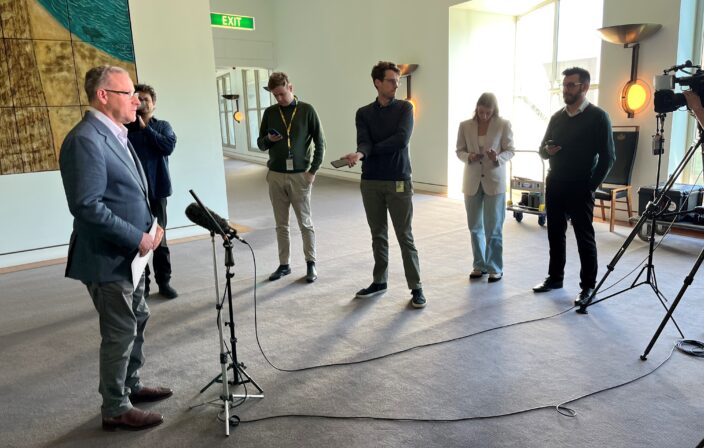Response to ACTU’s minimum wage submission
26 Mar 2024
|Transcripts
ABC News Breakfast, Tuesday 26 March 2024
E&OE
Emma Rebellato: Andrew McKellar joins us from Sydney. Andrew, thanks for joining us this morning.
Andrew McKellar: Good morning, Emma. Great to be with you.
Rebellato: What’s your submission to the Fair Work Commission? What increase would you be happy with and the business sector?
McKellar: What we’ve said is we think an increase of not more than 2 per cent is justified and look at the things that we put behind that. On the one point we have just released yesterday, our Westpac Industrial Trends Survey, it does show that in the March quarter, business conditions have weakened significantly. We’re seeing orders dropping away, we’re seeing investment going sideways. We’re seeing capacity utilisation down, and most importantly, we’re starting to see that employment and hiring decisions dropping off as well. And I think this is the real concern. We don’t want to see employment going backwards. We don’t want to see unemployment rising at this point in time. We want to keep Australia at or near full employment for as long as possible. Now, beyond that, we are seeing inflation also falling away. It’s at 4.1 per cent in the December quarter. We expect that it will drop further in the March quarter. Productivity has been extremely weak over the past 12 months. In fact, if you look at the national accounts, it’s gone backwards when you add all of that up. When you look at what the Fair Work Commission granted last year, an 8.6 per cent increase, well above inflation, and also the fact that there are other cost of living relief measures in place and coming into place from mid-year, we think that an outcome of 2 per cent will help inflation continue to fall and will take the pressure off interest rates more rapidly.
Rebellato: Andrew, the unions today has described your submission of 2 per cent as pretty sad and appalling, and the lowest paid workers will go back even further if they only get 2 per cent. How do you respond to that?
McKellar: I’d expect nothing different from the ACTU. Regrettably, they have learned very little in the past 12 months and they’ve remembered even less so. I think if you look at their submission of 5 per cent, I mean that is basically an open letter to the Governor of the Reserve Bank saying that they would be happy for interest rates to remain higher for longer. I did see some comments from one of the union leaders saying that business has the flexibility to put up prices. Well, that is to absorb the cost of higher wage increases. Now, that is basically, again, inviting or suggesting that inflation will continue to remain higher for longer. I can’t remember the last time that I heard an Australian union leader using the word productivity. They simply don’t have it in their vocabulary. And that’s the critical thing if we’re going to have higher wage increases.
Rebellato: Andrew, it sends you at odds with the federal government as well because the federal government is putting a submission that it thinks the wages should go up in line with inflation, which would be more than 2 per cent. Why has the government got it wrong?
McKellar: I think here again, a number of factors, at 3.5, 4 per cent. I think one of the things you’ve got to take into account is the fact that those economic conditions are coming off At the moment, productivity has been weak or negative, and if productivity has actually been going backwards, then that is another factor that the government really should be taking into account. Let’s see where the commission judges all of this over the coming months, and let’s see what the outcome is.
Rebellato: Andrew, if the commission comes back and sets the increase higher than 2 per cent, which is what you are calling for, what would be the outcome? How would businesses wear that?
McKellar: It will be very difficult for many businesses, particularly small and medium-sized businesses at the moment. They have been struggling with supply chain issues with cost pressures over many months. Now we’re starting to see that ease off a little bit, but wage pressures are still there, an average of around 4 per cent at the moment. If we were to push that up higher, then there’s no doubt that that would even more rapidly impact hiring decisions, and we are starting to see that. We’ve got to look beyond the labor force figures that came out just recently for February, a very strong employment result. But we think that’s distorted. We think that’s an aberration, and our concern is that we will see weaker employment in the months ahead.
Rebellato: We’ve got a little while to find out where the Fair Work Commission lands on this one. Andrew McKellar, thanks for joining us this morning.
McKellar: Thanks very much.


